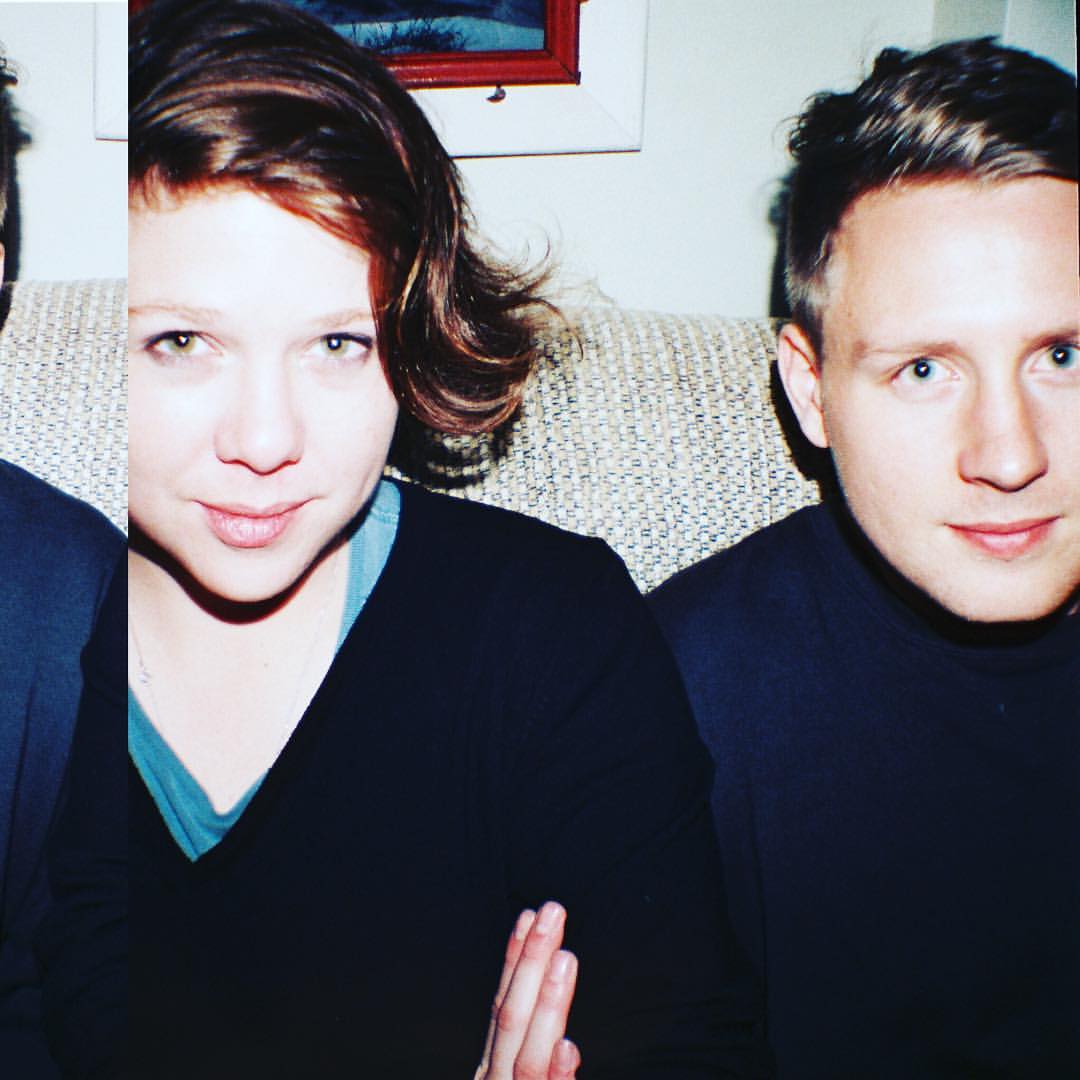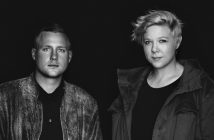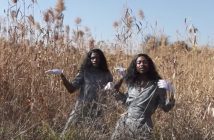We chat to Cape Town’s alt-pop duo, Lo-ghost, about their new EP, being a queer positive band, as well as their plans for the future

You guys changed your name from Lindiwe The Ghost to Lo-ghost, what was the reason for that?
In short, we were concerned that we were engaged in appropriation. We launched under Lindiwe the Ghost because the name held a very specific significance to us. It referenced someone Evan knew, who disappeared. With a personal connection and the fact that it referenced a specific person, albeit abstractly, we thought it occupied a different space to one of appropriation. But we realised fast that it would be moving through the world without us and without its corresponding explanation, and we could not control how it was received, and whether or not it did damage along the way. If there was any chance it could be harmful or violent, we wanted no part of it.
So now, we’re Lo-ghost. We like it. It’s an empty vessel word that can be packed with whatever we choose to fill it with, which is exciting.
When and how did you guys get together to form Lo-ghost and please share some of your highlights up to this point?
We have been working together for years in differing forms – initially, we forged our bond in the throes of the part-time service industry. Over the years, we’ve gotten to know each other pretty well. We know each other’s temperaments (rock steady) and work ethics (borderline masochistic). We knew we’d make a strong team. We tried to collaborate over the years, but it never stuck. Last November, though, we tried again, and it felt right.
There have been many highlights to date. The day we shot the video for “Ghost in a Blood Machine” was a really important day. We hadn’t seen the piece that Chester and Devon (the dancers in the video) had prepared, although Georgina Warner, our director, told us to brace ourselves. We rolled playback for the first take and sat against the warehouse wall to watch. We were both crying by the end of it. It’s difficult to explain a moment like that. It’s an overwhelming thing, when you feel the course of your life being shown to you so clearly in a particular moment. Those beautiful, transcendent, magic people who applied their art to ours on that work to make it bigger and more beautiful will never know how deeply that has impacted us. That day changed us, I think.
What are some of the hurdles that you have encountered as a new band?
I think any person who plays music will tell you that it can be challenging in a myriad of different ways. We’ve both been in various projects before, so we’ve been able to move through the often-tricky formative stages with relative ease.
However, in our work, we tend to explore really personal, painful themes. So I think a big part of our own challenge is having the guts and resilience to go to those deepest, darkest places every time we perform these songs and that means sometimes in public. But there is a pay-off. We go there, we look and prod at these sore things, and we come out feeling better.
You refer to yourselves as a “Queer-Positive Alt-Pop duo from Cape Town.” Does that mean all your work carries queer narratives?
We’re trying to make work that is as savagely honest and authentic as possible. One half of Lo-ghost (Shan) is queer and the other half (Evan) is an ally. These songs are an extension of self. So all of the narratives we present have that context. It’s who we are, so it manifests naturally in the music we make. These are our stories. The ‘queer-positive’ label serves a function, though. It lets people know our politics upfront. It’s a non-negotiable declaration. It also works as a type of vetting mechanism. We hope it lets people who identify with this community know that they are amongst friends with or around us and at our shows. Our hope is to make our shows spaces that are as safe as we can possibly make them. We will do everything in our power to ensure that. All are welcome, as long as they are down with contributing to the safeness of those spaces. That’s our greatest hope and that is what we’re working towards.
Cape Town is often dubbed the “Gay Capital” in South Africa. Is your music more appreciated in Cape Town than other parts of the country?
We’re still new, so it’s difficult to tell where our music is appreciated more, geographically and if there is a bias what the root of that bias would be. We just hope this music manages to travel far and that people can find use for it wherever they are in the country.
We’ve seen a rise in pro-queer artists in the last couple of years. Could this be another industry trend to gain followers or a long term movement?
We hope that the emergence of more pro-queer artists would be indicative of a positive shift in the narrative, rather than an industry strategy to gain followers. We would be really excited if it meant there was some kind of bigger movement catalysing. How great would that be? We need as much counter-hegemonic narrative as possible. Representation is so important. We aren’t able to represent everyone, so the more artists there are putting work out that communicates their lived experiences, the better. To be honest, with the levels of trans-/queer-/homophobia as they are, it’s doubtful in our minds that openly advocating for or expressing an alignment with the queer experience would do anything for sales and popularity in the grander scheme of things. That’s fine by us.
There has been a rise in artists with similar aesthetics to yours, which could mean more competition for you. What sets you apart from the rest?
Our identity seems to be articulating itself from the inside out. We’re intensely interested in this project being a genuine reflection of ourselves and our art as we know it and as we make it. We work hard in an attempt to make every touch-point authentic and interesting and we hope to continue collaborating with beautiful artists until our aesthetic subsumes a myriad of reflections. On a personal level, at the end of the day we’re just two six-foot odd kids trying our best to make something beautiful.
Tell us about your debut EP, Mother. Take us through the production process of the work and what to expect from it.
At the heart of our process is a huge Dropbox folder. It houses a considerable amount of material in various stages of development, waiting to be tracked. We run lean and do a ton of remote work, sending ideas and drafts back and forth via the DB. That helps us put together a huge amount of work in a short space of time. It’s a really efficient, agile workflow. When we were collating tracks for our debut EP, we picked five that we felt strongly about and put them into production. We worked closely with our great friend and producer Callum McDonald at Hey Papa Legend Studios, which is where we tracked and mixed the EP. We moved the demo drafts to the studio and then went about vetting and re-constructing. We had access to some beautiful vintage analog gear which we took full advantage of. We pulled in two wonderful friends, Ammy Hoffenberg and Londo Louw, to track backing vocals. It’s always useful to have burning vocalists as friends. At one session, London Louw was in the booth for six hours straight. This is how we work: hard and fast. The EP was mastered by Ross Finck at Fin Mastering.
What you can expect from this EP is a good indication of what is to come. It was our first offering, and it set a tone creatively. The work is cuttingly honest, and sometimes that was difficult. We spend a lot of time examining things that hurt us, going to places within ourselves most people try to avoid. These are the things you actively turn your psychology away from whenever they try to express themselves. That’s where we had to go to make these songs. So there’s pain there but there’s also a power. To capture those dark things and bottle them in songs makes them less dangerous to us. It helps with the scar tissue and the processing. We feel better and changed after making that work and we hope others will find similar use for these songs, if only to know that they are not alone in what hurts them and that there are others who understand. It’s a dark collection of songs, but there’s humanity in that.
The music video for “Ghost in a Blood Machine” was well received and we loved its storyline. Are you guys going to release any more videos from Mother and will your videos always address social issues?
We are already in the thick of things producing our debut album. We’re deep into the process, so we don’t think we will be releasing any more videos for work from Mother. Future releases will be drawn from this new body of work. We’re currently setting up visual collaborations for these pieces and we’re really excited to see what results.
What’s next on your to-do list for 2016?
We’ll be releasing our next single “Lay Your Hands” before the end of the year and the rest of 2016 will be spent making this album as good as we can get it. We’re going to be playing some exciting shows too: on the 12th of November we’re performing at the Pride Shelter Trust Fundraiser, an organisation doing beautiful things, and on the 8th of December at the Waiting Room, which promises to be a banger.




